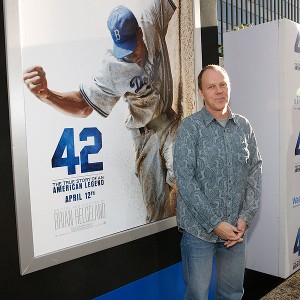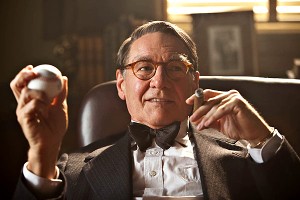COMMENTARY
Getting it right in '42'
The Jackie Robinson film was a nonstop two-year project for Brian Helgeland
Originally Published: April 12, 2013
By Jerry Crasnick | ESPN.comBaseball Comes To Hollywood
Jayson Stark, Jerry Crasnick, and Jim Caple review the new Jackie Robinson movie, 42.Tags: MLB, Jayson Stark, Jerry Crasnick, Jim Caple, Jackie Robinson,Rachel Robinson, 42
NEXT VIDEO 
Some writers prefer a mountain retreat or an ocean view with a majestic sunset when they're searching for inspiration. Brian Helgeland, the director, screenwriter and creative force behind the Jackie Robinson biopic "42," found his artistic vision on a bus ride from Massachusetts to New York in the spring of 2011.
[+] Enlarge

AP Photo/Invision/Todd WilliamsonBrian Helgeland, here at Tuesday's L.A. premiere, invested the past two years of his life in "42."
As Helgeland tells it, his octogenarian father called one day out of the blue because he wanted to take a nostalgic trip to his boyhood home in Brooklyn, N.Y. Thomas Helgeland is a bit old-fashioned when it comes to travel, so father and son hopped a bus rather than take a plane.
Six hours into the trip, Brian Helgeland received a phone call from Thomas Tull, a producer with whom he had partnered in the past. Tull was trying to buy the rights to Robinson's life story from Jackie's widow, Rachel, and he wanted to know if Helgeland had any interest in the project.
Cue the epiphany: The bus was navigating Manhattan traffic, and Helgeland was in midconversation with Tull when he gazed out the window and saw a billboard with Jackie Robinson's likeness and the message, "Character: Pass it On."
"It was a strange piece of serendipity," Helgeland said. "It came a little bit like a lightning bolt."
Three days later, after reading a healthy chunk of Robinson's autobiography, Helgeland was sitting in a New York office explaining his creative vision to Rachel. Thus began a project that would consume his every waking hour for the next two years.
ESPN Looks At "42"

Hollywood brings the Jackie Robinson story to life with the release of "42," a movie that chronicles Jackie's journey from the Negro Leagues in 1945 to his rookie season with the Brooklyn Dodgers in 1947. ESPN's coverage of the film:
• Jerry Crasnick: "42" gets it right
• Jim Caple: Stuntman keeps it real
• Our Review: Writers rate the flick
• ESPNW: Protecting Jackie's legacy
• The Mag: Star-studded premiere
• Grantland: A lifeless biopic
• Paul Lukas: Uni Watch realities
• Sam Alipour: On the red carpet
• Playbook: McGinley talks Red Barber
• Ian O'Connor: Enlightening a nation
• Jim Caple: Stuntman keeps it real
• Our Review: Writers rate the flick
• ESPNW: Protecting Jackie's legacy
• The Mag: Star-studded premiere
• Grantland: A lifeless biopic
• Paul Lukas: Uni Watch realities
• Sam Alipour: On the red carpet
• Playbook: McGinley talks Red Barber
• Ian O'Connor: Enlightening a nation
Movie watchers across America will have an opportunity to decide if Helgeland got it right when "42" makes its national premiere in theaters on Friday. "42" is a sports movie, of course, but inevitably so much more, about a historic struggle that changed society and still resonates 66 years later.
Helgeland, 52, had an impressive list of film credits before tackling Robinson's story. He wrote the screenplay for Clint Eastwood's "Mystic River," won an Academy Award for best adapted screenplay for "L.A. Confidential," and established his credentials as an ego-free good sport by appearing in person to collect a Razzie Award for worst screenplay of the year for the Kevin Costner movie "The Postman" in 1997.
Helgeland also has an appreciation for America's pastime. Growing up in the Massachusetts fishing port of New Bedford, he received his indoctrination to fandom via the Boston Red Sox of Carl Yastrzemski, Reggie Smith and his all-time favorite player, George "Boomer" Scott. He has been to Fenway Park only once, but that's because his dad thought it impractical to drive 55 miles to Boston when all the games were aired on television.
One of Helgeland's main hurdles in resurrecting the Robinson story was gaining the trust of Rachel, who was understandably protective of her husband's legacy and wanted to make certain he would be portrayed with the requisite sensitivity and care. Rachel initially envisioned a cradle-to-grave portrayal that began with Jackie's boyhood in California and ended with his death in 1972. But Helgeland thought it would be easier to maximize dramatic tension with a smaller focus, so the movie begins with Robinson's tenure as a Kansas City Monarch in the Negro Leagues in 1945 and runs through his rookie year with the Dodgers in '47.
Rachel embraced that approach, to Helgeland's relief, and provided some helpful technical advice along the way. During one scene early in the film, Jackie dances off third base in a spring exhibition game with enough zeal to coax a balk out of a harried Dodgers pitcher. The script originally called for Rachel to ask sportswriter Wendell Smith what had just transpired. But when the real Rachel read the passage, it didn't ring true.
[+] Enlarge![]()
Courtesy of Warner Bros. PicturesChadwick Boseman stars as Jackie Robinson in "42."
"She came in with the script, and I was nervous," Helgeland recalled. "She said, 'In what world do you think the wife of Jackie Robinson wouldn't know what a balk is?'" Helgeland agreed with Rachel's observation, so he tweaked the scene and had a young fan in the stands explain to his mother that Jackie had just "discombobulated" the pitcher with his derring-do on the bases.
Helgeland was particularly concerned with making the on-field action authentic, so he watched several baseball movies and tried to avoid what he calls the "clumsy" action sequences so prevalent in the genre. His favorite baseball film of all: "The Bad News Bears."
"There's a joy to that movie and an innocence," Helgeland said. "It gets to the heart of baseball despite all its oddball characters. Baseball brings everyone together no matter where they're from or how different they are, and there's a redemptive quality in the Walter Matthau character."
Helgeland did the bulk of the filming for "42" at Rickwood Field in Birmingham, Ala., and Engel Stadium in Chattanooga, Tenn., two old minor league parks, and used computers to simulate shots of Ebbets Field, Crosley Field and other venues from the '40s. For the sake of precision, he even tracked down the old stadium blueprints to make sure every nook and cranny was accurate.
Helgeland also used tender loving care with the human interest details. Brooklyn manager Burt Shotton did indeed wear street clothes beneath his Dodgers cap and jacket. Kirby Higbe, one of the main anti-Robinson agitators in Brooklyn, was traded to Pittsburgh for Al Gionfriddo in May of 1947 because of his resistance to playing on the same team as a black man. And Pee Wee Reese's brotherly embrace of Robinson in Cincinnati was a necessary inclusion in the film, even though author Jonathan Eig calls many of the details of that famed encounter into question in his book "Opening Day."
[+] Enlarge

D. StevensThe relationship between Branch Rickey (played by Harrison Ford) and Robinson is at the core of the movie.
"Brian seemed very sincere and cautious of making sure that this movie was done right," former big league pitcher C.J. Nitkowski, who appears in the movie as Phillies pitcher Dutch Leonard and is an ESPN Insider contributor, said in an email. "He seemed very sensitive to how important it was to tell the story in an accurate way."
Oddly enough, Nitkowski throws from the left side, while the real Dutch Leonard was right-handed. But far more often than not, the filmmakers were faithful to reality. From super-scout Clyde Sukeforth's Maine accent, to the press box banter, to Branch Rickey's stale cigars, Helgeland sweated the details. He even made sure that Robinson's home runs and stolen bases were taken directly from actual box scores.
Ultimately, the relationship between the Robinson character, played by Chadwick Boseman, and Harrison Ford's Branch Rickey forms the backbone to the film. Baseball connoisseurs might quibble with an emotional exchange between the two in a dugout runway in Philadelphia because general managers rarely amble down behind the dugout, but it's a cathartic and poignant scene that frames Robinson's anguish like no other moment in the movie.
Alan Tudyk, the actor who plays Philadelphia manager Ben Chapman, has publicly shared his discomfort over the vile, racially charged language his character uses in the movie. It was a deft balancing act conveying the gritty side of Robinson's struggle while maintaining a PG-13 rating, but Helgeland's script pulls it off because of some excellent performances and just the right mix of humor.
[+] Enlarge![]()
D. StevensNicole Beharie plays Rachel Robinson, who was instrumental in getting the film made.
Helgeland has already received a strong endorsement from the wife of America's moviegoer-in-chief. During a private screening at the White House recently, first lady Michelle Obama gave "42" a glowing review. "It was better than a Roger Ebert thumbs-up," Helgeland said.
The national release of "42" coincides with an initiative by commissioner Bud Selig to study the declining participation of blacks in baseball. If aspiring African-American ballplayers take the lessons of the film to heart in the same way that future big leaguer Ed Charles was affected watching Jackie Robinson in spring training in Daytona Beach, Fla., in the movie, Helgeland will have achieved his goal.
"I think the movie does a neat trick," Helgeland said. "Whether you're white, black or Hispanic, you follow Jackie Robinson and you root for him. I tried to do it in a way where you experience what he experienced as a human being. When he's being harangued by the Philly manager, I think the audience will feel for him and feel with him because they're traveling the movie with him.
"If anything, you want to feel the humanity of it. Here's a guy who, under difficult circumstances, did everything in his power to do the right thing. Branch Rickey can't be the guy on the field suffering the abuse, but he's also trying to do the right thing. It doesn't have to be some monumental moment. The story just reminds everyone that there's a right way to go through life. Hopefully, it will inspire everyone on a day-to-day basis."
- ESPN.com senior writer
- Author of "License to Deal"
- Former Denver Post national baseball writer

No comments:
Post a Comment